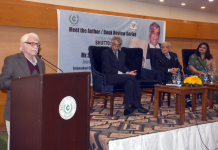WASHINGTON | ISLAMABAD, MAY 10: /DNA/ – After intensive overnight negotiations facilitated by the United States, India and Pakistan have reached a historic agreement for a full and immediate ceasefire, effectively de-escalating heightened tensions between the two nuclear-armed neighbors.
The breakthrough follows a series of diplomatic engagements aimed at preventing further military confrontation. Both nations have demonstrated common sense and statesmanship in agreeing to halt hostilities, paving the way for stability in South Asia.
Key Points:
- Ceasefire takes effect immediately across the Line of Control (LoC) and all disputed zones.
- U.S. mediation played a pivotal role in bridging differences between the two sides.
- Diplomatic channels to remain open to ensure compliance and discuss long-term peace measures.
Statement:
“We commend the leadership of both India and Pakistan for prioritizing peace and regional security. This agreement marks a crucial step toward reducing tensions and fostering dialogue. The world welcomes this decision, and we remain committed to supporting further diplomatic efforts.”
The international community has lauded the development, urging continued restraint and constructive engagement between the two nations.
Background Points on the recent developments in Pakistan-India Relations
(Non-attributable basis)
- Pakistan and India have agreed to a ceasefire till 12 May 2025, noon. Several foreign ministers of friendly countries conveyed India’s messages of strong interest in deescalation and ceasefire to the Deputy Prime Minister/Foreign Minister. It is important to put this development in the right perspective. Pakistan agreed to the ceasefire in the interest of regional peace and stability.
- India has been violating Pakistan’s sovereignty since 7 May 2025. Its actions endangered regional peace and stability. However, Pakistan was showing maximum restraint.
- India’s drone and missile incursions added to the volatility of an already unstable security environment.
- In the intervening night of 9 and 10 May 2025, India launched missile attacks on many Pakistan Air Force bases and airports.
- In view of India’s unabated aggression, Pakistan had to exercise its right to self-defence, as enshrined in Article 51 of the UN Charter.
- No country could compromise on its sovereignty and territorial integrity.
- The purpose of our action was to demonstrate our right, will, and capability to defend our territory and people.
- Pakistan has achieved its objectives. It has successfully defended its territory and restored deterrence.
- India’s efforts to establish a “new normal” in bilateral relations have been successfully thwarted by Pakistan. Pakistan shall not allow India to impose its hegemony and jeopardise regional peace.
- Pakistan unequivocally condemns India’s illegal actions. Under international law, the Indian actions since 7 May 2025 manifestly constituted acts of war.
- The Indian actions were a flagrant violation of the UN Charter, international law, and established norms of governing inter-state relations.
- It is most unfortunate that India’s reckless conduct has brought the two nuclear-armed states closer to a major conflict. India’s jingoism and war hysteria should be a source of serious concern for the world.
- South Asia is home to over one-fifth of the world population. It could ill-afford the irresponsible actions like the ones being carried out by India.
- India blamed Pakistan for the Pahalgam Attack, without any verifiable evidence or credible investigations. On 26 April 2025, the Prime Minister of Pakistan proposed a transparent and independent probe into this tragic incident through neutral investigators. However, India chose the path of belligerence and aggression.
- A number of countries had called for the exercise of restraint during the last few weeks. The international organisations like the United Nations and the Organization of Islamic Cooperation had also counseled the same. It is highly deplorable that India did not pay heed to these calls.
- We have been apprising our international partners of India’s mal-intentions since the beginning of the crisis. The Indian actions demonstrate that our concerns were genuine.
- We remain committed to defending our sovereignty and territorial integrity with full vigour.
- The international community should hold India accountable for its irresponsible, unlawful and belligerent conduct.
- Pakistan desires a lasting peace in the region. However, it takes two to tango. India would have to stop its aggressive actions. We shall never allow India to impose its hegemony in the region. Any aggression against Pakistan will meet a matching response.

















